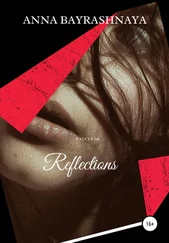Sergei Lukyanenko - Labyrinth of reflections
Здесь есть возможность читать онлайн «Sergei Lukyanenko - Labyrinth of reflections» весь текст электронной книги совершенно бесплатно (целиком полную версию без сокращений). В некоторых случаях можно слушать аудио, скачать через торрент в формате fb2 и присутствует краткое содержание. Жанр: Киберпанк, на английском языке. Описание произведения, (предисловие) а так же отзывы посетителей доступны на портале библиотеки ЛибКат.
- Название:Labyrinth of reflections
- Автор:
- Жанр:
- Год:неизвестен
- ISBN:нет данных
- Рейтинг книги:5 / 5. Голосов: 1
-
Избранное:Добавить в избранное
- Отзывы:
-
Ваша оценка:
Labyrinth of reflections: краткое содержание, описание и аннотация
Предлагаем к чтению аннотацию, описание, краткое содержание или предисловие (зависит от того, что написал сам автор книги «Labyrinth of reflections»). Если вы не нашли необходимую информацию о книге — напишите в комментариях, мы постараемся отыскать её.
Sergey is married, he lives in Moscow.
Email: sl@amc.ru Homepage: http://www.rusf.ru/lukian/ (In Russian)
THE NOVEL «LABYRINTH OF REFLECTIONS» IS COPYRIGHTED BY SERGEY LUKJANENKO, ALL RIGHTS ARE RESERVED BY THE AUTHOR. ANY COMMERCIAL USE OF THE NOVEL'S TEXT IS STRICTLY PROHIBITED.
Copyright Sergey Lukjanenko "Labyrinth of reflections" Copyright translation by Yuri Kalmykov aka Mohatu , 1998 * Yuri Kalmykov. Translator's notes * Several notes for the reader:
1). My English sucks. So it was obviously way too presumptuous of me to try to make a translation like this. It was my love to this book only that made me to venture into this adventure. ;-) I was hoping that this novel is really worth your kind attention (despite my ugly English?).
2). Some opinions expressed in this book by the main or other characters, as well as some words/terms used, might be considered offensive to some Western readers. In fact, one such situation was even showed closer to the end of the novel itself. The concept of "PC" (aka 'Political Correctness') does not really exist in Russia which fact IMHO makes the life much easier and slightly reduces the amount of stupidity that inevitably presents in this life. Despite that, I definitely had to use the 'softened' terms in my translation in order not to outrage the people (not too much at least). But of course, something might have still leaked out. Please consider yourselves warned.
3). FIDO Some more confusion can be caused by Lukjanenko's technical details and descriptions of the Net due to one more fact: he writes from the point of view of the person who was once the FIDOnet member. Also it seems that Sergey himself was mostly affiliated with FIDO at the time of this book's writing. The principles of FIDO's system organization differ from the ones of the Internet. I never was FIDO member, so I know very little. In general, it's free, amateurs' network that allows its members to exchange emails and files. FIDO uses its own proprietary protocol. Special gateways are used to exchange emails with the Internet. Look at www.fidonet.org for more details… But be prepared to get back not the homepage, but some HTML code. {
} The guys have forgot to put the {
} tag into the code of their main page… OOPS.
4). The names.
The same name in Russian usually can have several forms, reflecting the attitude of the one who pronounces the name to the one named. The number of these forms is as far as I can judge, much bigger than in English. That's why in my translation I preferred to retain the original rules of forming such names and to provide this note. Another important reason is that the Russian name changed according to the rules of doing so in English would sound ridiculous (maybe for me only, as I'm Russian… ;-) ), not mentioning that it's not always possible to do this with Russian names at all. Example: John – Johnny. Now try to do the same with, say, my name: Yuri. Yup… My point exactly. Below is the example of how the first name of the main character can be 'bent'. The same often happens to other names in the book. For inexperienced reader it might be confusing, so I apologize… Russia *is* confusing by definition, so bear with it. :-)
Leonid Lenia Lenechka Len'chik Len'ka ( here ' means softening of the previous sound, 'n' in this name sounds like 'n' in the word 'change') – Unceremonious address, a bit slighting. Often used by close friends without any offensive context.
… and so on. No more forms are used in the book, so I'd better not confuse you any more.
Another trick is how the names are formed n general. In particular, the concept of the middle name in Russia. It is not 'given', but rather is the father's name. To be used as a middle name, special endings are attached:
-ovich, -evich for man's middle name (yeah, they are gender specific!),
-ovna, evna for female's middle name.
Examples: Petrovich Alekseevich – men's Petrovna Alekseevna – women's.
Also, the last names of the Russian origin are gender specific too. To women's form the ending -a is usually attached: Kalmykov for me becomes Kalmykova for my Mother, as opposed to her maiden name which is Cellarius – not originally Russian one and as such not gender specific.
There's much more about Russian 'naming system', but I think it's enough said here in order to a). totally confuse an unaccustomed Western reader, and b). to explain the names in the novel for those who managed to overcome the confusion. {
} And the last thing:
5). Any feedback will be greatly appreciated! Any questions/opinions are welcome to mohatu@ameritech.net. Hate mail/flames will be ignored. Thank you!
Yuri Kalmykov aka Mohatu, Waukegan, IL, February-November 1998.
http://www.lionking.org/~mohatu/translations.htm











